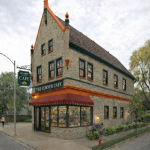SDC Could Lose Funding Following Board Resignations
Beleaguered social welfare agency's board is now too small by at least one state standard.

Vacant seats on the Social Development Commission’s board could jeopardize the organization’s status as a community action agency. (Photo by Joe Timmerman / Wisconsin Watch)
In the months since the Social Development Commission suspended operations because of financial troubles, its board has dwindled in size.
Now the vacant seats on the Milwaukee agency’s board could pose a problem for SDC’s status as a community action agency eligible for millions of dollars in federal funding to tackle poverty.
SDC halted services and laid off employees in late April, leaving a gap in essential services for many low-income residents in Milwaukee.
Wisconsin law requires a community action agency, including community relations-social development commissions like the SDC, to be governed by a board made up of 15 to 51 members.
The SDC Board of Commissioners currently has seven board members because of a number of commissioners resigning over the last six months and two leaving when their terms recently expired. Barbara Toles, the board’s chair, resigned last week.
At full capacity, the board operates with 18 commissioners.
William Sulton, SDC’s attorney, said the SDC is reaching out to agencies that need to reappoint members to its board but has not made much progress.
“We have to gain back the confidence of state agencies, to say nothing of the public,” he said.
It is not uncommon for the number of members on a community action agency board to go up and down because of resignations and life events, according to the Wisconsin Department of Children and Families (DCF).
“I would guess that having fewer than 15 board members would be problematic, given Wisconsin’s guidelines,” said Ryan LaRochelle, a senior lecturer at the University of Maine’s Cohen Institute for Leadership and Public Service.
Block grant funding
The SDC submitted an application for Community Services Block Grant funding for 2025 to DCF, which was due Oct. 1. The department had planned to allocate about $2.2 million in block grant funding to the Social Development Commission in 2025 if its application is approved, according to a draft plan.
The Department of Children and Families is currently reviewing applications from eligible entities before the contract year begins on Jan. 1.
DCF spokesperson Gina Paige said her agency is working with SDC and the federal Office of Community Services “to determine the best step forward.”
SDC’s board has yet to hear whether the state agency has approved its application or made any changes in funding or community action status, Sulton said.
Despite the uncertainty, Sulton remains hopeful that the department will continue to work with SDC.
“We think that that’s a positive development and recognition that Milwaukee County’s best chance of dealing with poverty is SDC – that there is no other agency or collection of agencies that even comes close to doing what SDC did before it suspended its operations in April,” Sulton said.
If an agency has not met the minimum board member requirement for over 90 days, DCF will provide technical assistance and may issue an improvement plan, a department spokesperson said.
What are community action agencies and why are they important?
In 1963, state, county and city officials established the Social Development Commission as an intergovernmental commission that would study and recommend solutions to issues impacting people in poverty in Milwaukee County.
SDC later became a community action agency after the Economic Opportunity Act of 1964 created the Community Action Program, as part of President Lyndon B. Johnson’s War on Poverty.
Like other community action agencies around the country, SDC offers programs to address poverty at the local level, including employment, education, finance and health services.
“The point of a CAP (Community Action Program) agency is to try to better that person’s situation and move them out of poverty versus just providing a direct service,” said Kassidy Farrey, the interim executive director of the Wisconsin Community Action Program Association, or WISCAP.
Community Services Block Grant funding provides federal funding to over 1,000 community action agencies nationwide but also requires recipients to be monitored and meet a set of organizational standards.
“Those responsibilities can be heavy on an organization for sometimes what can be seen as a relatively small amount of federal money,” said Denise Harlow, CEO of the National Community Action Partnership, a member association for community action agencies. “We often say CSBG may be a small percentage of your budget, but it’s kind of your community action. That’s what makes you a community action agency. “
Meeting other application requirements
Applicants for block grant funding must meet additional requirements.
Block grant funding contract managers check applications for the necessary components before approval, including the agency’s budget and expected services for which it will use the funding, according to the Department of Children and Families.
Farrey said both the board member requirement and demonstrating how SDC plans to operate programs with block grant funding are important.
“I would think that the priority would be how they would be focused on getting the programs up and running,” Farrey said.
Addie Costello, a reporter with Wisconsin Watch and WPR, contributed reporting to this story.
Meredith Melland is the neighborhoods reporter for the Milwaukee Neighborhood News Service and a corps member of Report for America, a national service program that places journalists in local newsrooms to report on under-covered issues and communities. Report for America plays no role in editorial decisions in the NNS newsroom.
Smaller board puts SDC at risk of losing sizable funding was originally published by the Milwaukee Neighborhood News Service.
If you think stories like this are important, become a member of Urban Milwaukee and help support real, independent journalism. Plus you get some cool added benefits.





















